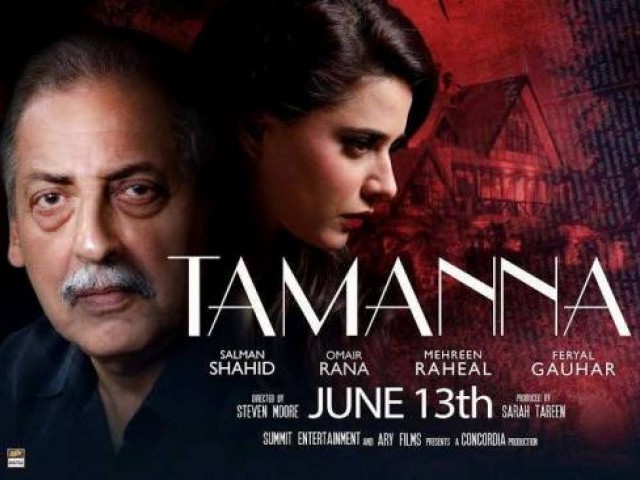
You don’t formulate movies (like Barfi!) targeting its box-office potential or its commercial prospects. You create such films for its passion of cinema.”
This statement applies to Tamanna as well; which takes several brave strides. It fulfils what it sets out to do and keeps you hooked and guessing all the while.
Based on a well-known Anthony Shaffer play, Sleuth,
the film incorporates elements of dark humour, melodrama, crime,
passion and revenge. This is the fourth adaption of the play on screen,
the first one starring Lawrence Olivier and Michael Caine in 1972,
followed by a remake starring Michael Caine and Jude Law in 2007 and a
made-for-TV West Bengali adaptation.
The
film’s hero is Rizwan Ahmed (Omair Rana), a struggling actor who meets
Mian Tariq Ali (Salman Shahid), a relic of the once-thriving film
industry. The struggling actor, Rizwan, is there to convince Ali to
divorce his wife, played by Mehreen Raheal. A contest of male dominance
between the two men ensues; starting quite reasonably, playfully even,
but eventually turning angry and violent.
Director
Steven Moore has made a mature and evenly paced film, detailed with
layers. The film keeps you interested, attentive and anxious to learn
about what will unfold. While most thrillers only work well if someone
gets caught, here, the story sails through even after you have figured
it all out. I especially enjoyed the scene with the police character,
Faisal Khan; the director made clever use of a load-shedding blackout to
conceal the policeman’s identity and build the anticipation. Also, the
viewer needs to savour Salman Shahid and Omair Rana’s brilliant
performances; one of the strengths of the movie.
Another
important aspect of the film is the stunning cinematography,
complimented by the film’s original background score and songs by local
artists.
The
second half of the film relaxes, where it could be tauter. One grouse
would be that the sub-plots in the story are likely to test your
patience at some points, as the narrative deviates from the pure
treatment, with a lot of twists and turns. However, thankfully, ‘Tamanna’
doesn’t come unhinged. The first rate performances, especially of
Salman Shahid, under Moore’s direction, help steer it to shore.
What does ‘Tamanna’ mean for new Pakistani cinema?
Content
is king in movies, where a new age of realism and portrayal of reality
onscreen has become a common film-making practice, as opposed to showing
a larger than life drama. The set formula used earlier, of a big star
cast, exotic locations and song and dance, is at risk of falling flat
without a solid script and concept. The internet generation is becoming
more aware of world cinema and content quality.
In
terms of cinema, one must distinguish between ‘popular’ and
‘important’. Popular, or mainstream, cinema means remaining within the
expectation of the audience and the dominant ideology of society from
which it arises. Whereas ‘important’ refers to cinema with ideas that
are not yet fully realised or discussed, or are generally
under-represented by the mainstream. In the conventional sense, these
films were considered ‘Art Cinema’ or ‘Parallel Cinema’. This means that
these films are intelligent and they are meant for a niche audience
(read: poor box office).
This
no longer applies, as we see how Indian commercial cinema (in spite of
mainstream Bollywood) has taken a different route of late, entertaining
its viewers with the blend of auteur and new age cinematic realism.
This is evident from the selection of ‘Barfi’ for an Oscar consideration or the official selection of ‘Gangs of Wasseypur’
at Cannes. With directors, such as Anurag Kashyap, Madhur Bhandrakar,
Dibakar Banerjee, Vishal Bhadwaraj, Imtiaz Ali, Nagesh Kuknoor, Santosh
Sivan and Srijit Mukherjee amongst others, and their individualistic
approaches, it is clear that Indian cinema now takes the art more
seriously.
With
all the talk of the revival of Pakistani cinema, or a new age of film
emerging, are we going straight to this situation of having both the
commercial and art cinema, not wasting time catching up like the Indian
cinema did over 20 or 30 years? Time will tell. But Tamanna, with its postmodern stance towards style, is certainly a step in the right direction.








0 comments:
Post a Comment